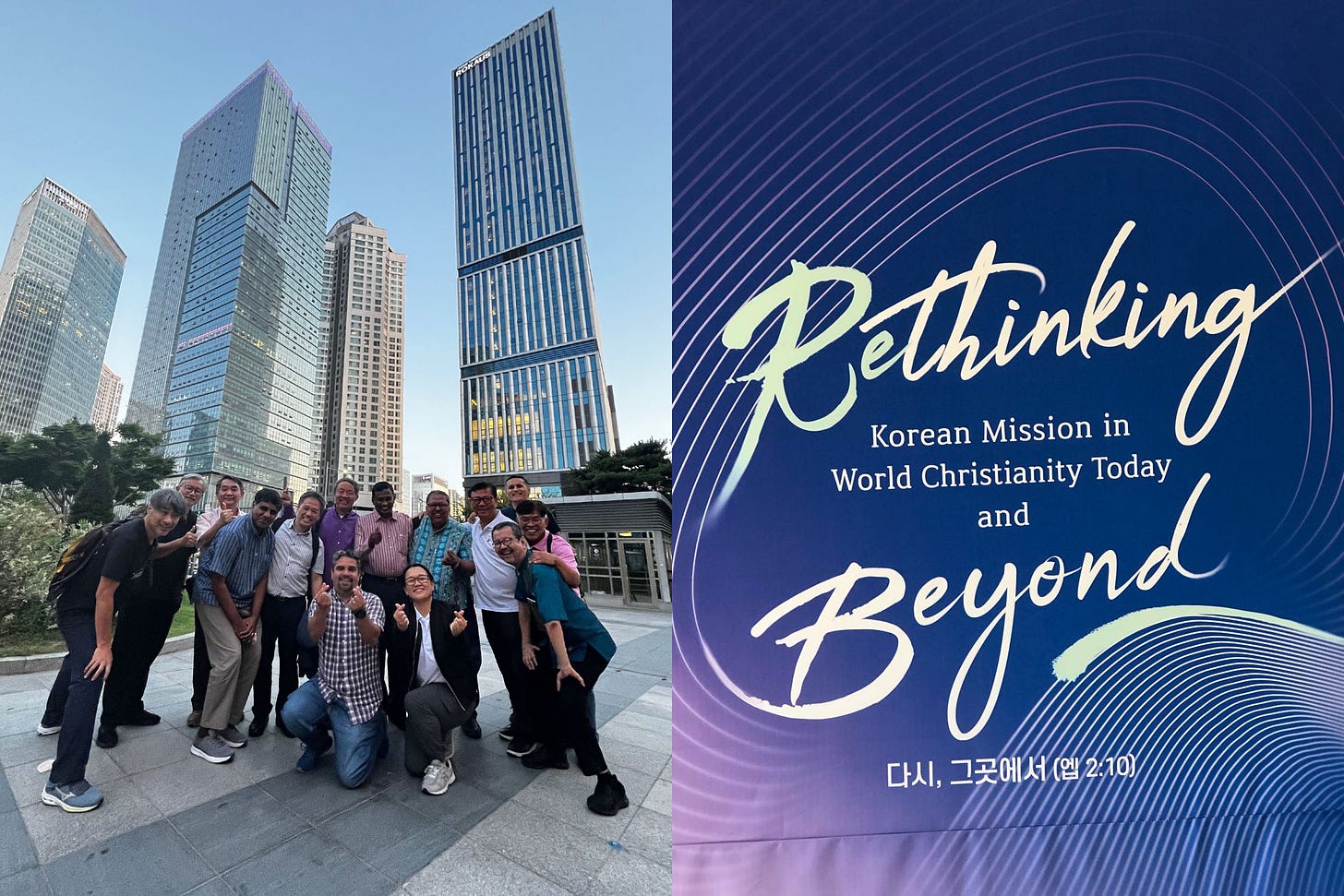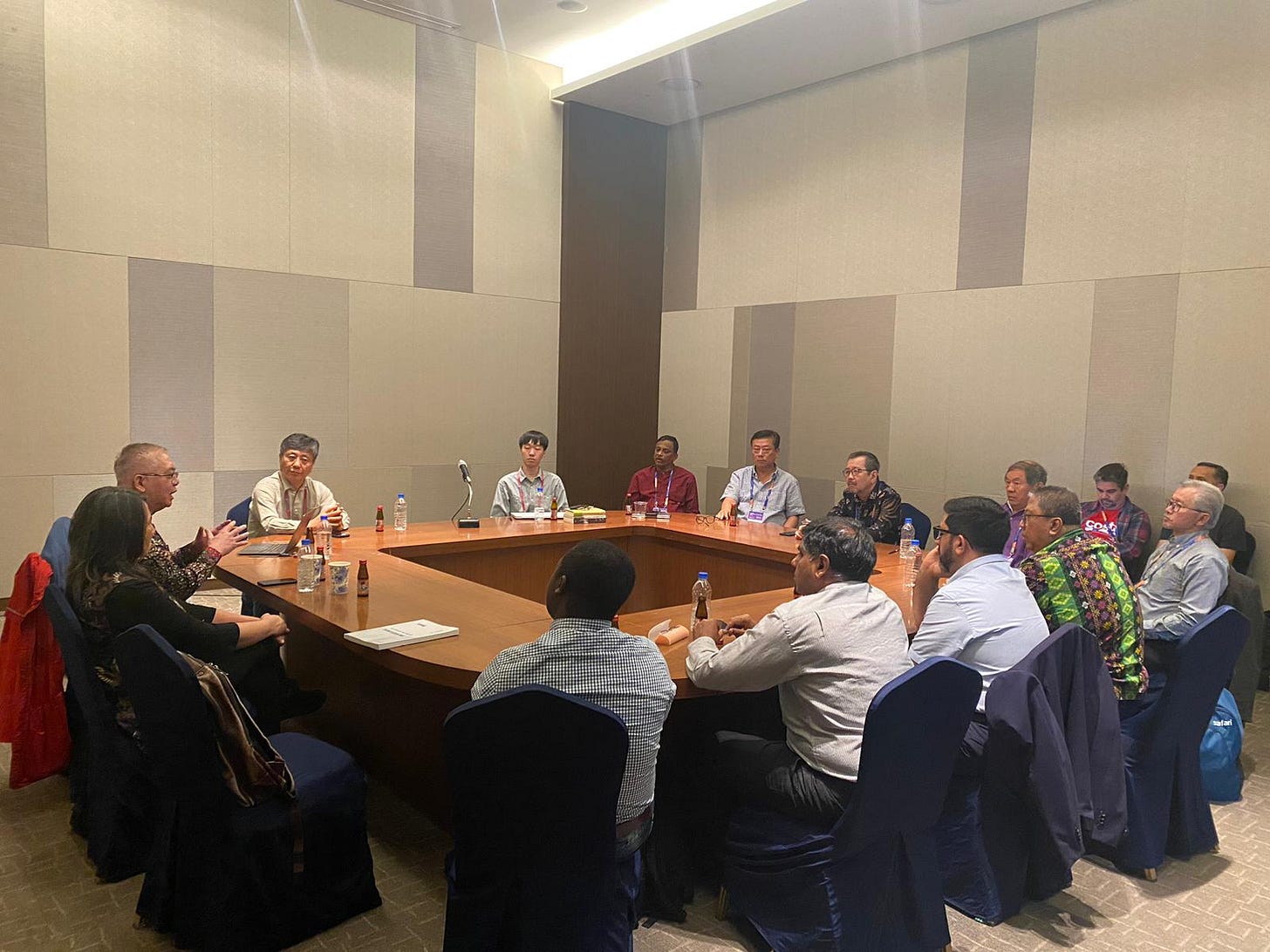I just returned from a wonderful week in Korea - full of kimchi and koinonia!
I was among a handful of global mission leaders (from Asia and Latin America) invited to South Korea for the once-every-four-years National Consultation on World Evangelization (NCOWE VIII) that brought together Korean evangelical missionaries and leaders under the auspices of the Korean World Mission Alliance (KWMA). [1] We met in the lovely surroundings of Pyeong Chang, a city in the Taebaek Mountains, about 180 km South-east of Seoul. It was my first time in Korea.
The time with about 600 missionaries, mission and church leaders was typical of Korean Christianity - full of vibrant worship, passionate prayers and seemingly-endless but powerful preaching and teaching on issues of great relevance to the modern missionary endeavour: Korean mission in world Christianity, holiness, new paradigms and best practices for Kingdom mission, frontier missions, etc.
The story of the coming of the Gospel and its subsequent spread in Korea is a truly wonderful work of God, one of the wonderful success stories in global missions [2] Indeed, Korea is today the 2nd largest missionary-sending nation in the world, next only to the US. Last year, an estimated 22,204 Korean missionaries were serving all across the the world. This is an incredible thing, given the relative size and recent history of Christianity on the peninsula.
During the conference, the global mission leaders had an opportunity to meet each day to share our thoughts and reflections on the topics being presented. On the whole, what we heard from them was a desire to re-examine and re-think the way their missionaries hitherto have operated, particularly with the rise of a global Christianity outside the Western world.
There was tacit recognition that the success of Korean missionary efforts (though blessed of God) had, on the back of their great passion, hard work ethic, determination and support from well-to-do Korean churches, resulted in the 'exporting' of a Korean brand of church and mission.
Over the years, I have sadly heard negative comments from indigenous Christians about Korean missionaries working in their countries. They were often found to heavy-handed and unyielding in their approach, committed to a hierarchical form of leadership that gave little room or freedom for indigenous leadership to emerge. The Korean work ethic and models of spirituality tends to be the dominant forms being pushed at locals. Some have even compared this to the colonising mindset that have so blighted the history of the Western missionary movement - a kind of Korean neo-colonialism.
There was talk of how the old paradigms of mission operated largely in a unidirectional way where the sending or pioneering missionaries came in a position of power. They brought the Gospel in strength, with resources, political privilege and advantage and sometimes, took absolute control - dictating the way church and mission was to be done in ways that resembled the churches they came from. [3]
However, at NCOWE VIII, I discerned in our conversations at table and from the themes addressed from the stage, a genuine desire to alter and adjust this perception of Korean mission - to move towards a new paradigm of Christian mission, one in which given the rise of a global Christianity in formerly mission fields, could result in a new way of serving together in mission, in which we approach and treat each other as equal partners, in collaboration and mutuality, careful in the exercise of resources, people and power.
As I look back over the time we had with influential leaders from Asia and Latin America as we interacted with our gracious Korean hosts who were themselves key leaders of the KWMA, I learnt and observed a lot from our time together.
In particular, I discerned 4 steps that the Korean mission enterprise seemed ready and poised to take. If other parts of the global family made these same efforts, I believe God can take hold of us in a new way, to posture and position His global Church in Mission to grow in effectiveness and fruitfulness to meet the challenges and seismic shifts that are taking place in our world today.
1. Repentance: There were calls for the Korean missionaries and churches to repent of arrogance and hubris that has characterised some of their missionary enterprise. But indeed, such ethno-centric and prideful tendencies need to be uprooted everywhere the global family of God is found. We easily bend to the all-too common tendency try to do the works of the Kingdom is our own strength and character, seeking to form the Church that belongs truly to Jesus into our own cultural (or national or denominational) image.
Repentance indeed is not only the first response we make when we hear the good news of the Kingdom and are redeemed by grace through faith in Christ (Mathew 4:17, Acts 2:38) but it is also the on-going pre-requisite in our onward journey as believers (2 Chronicles 7:14; Isaiah 55:6-7; Acts 26:20). We are to be quick to turn back when we go astray - to "metanoia" - the change of mind or re-orientation from self into God's way and will. [4] We were reminded at the conference that no great move of God (either in Scripture or history) occurred without God's people first repenting individually and collectively.
2. Reflection: Secondly, there is a need for humble reflection and examination of the goals, values and methods we engender in our missionary efforts, when matched up to God's Word and Spirit. We were led in the smaller table group discussions to reflect critically on the challenges we saw, the issues and problems we may have ignored, and what God is saying to us in the now.
Critical areas like discipleship, disciple-making and church-planting, in addition to more specialised issues like reaching the next generation, diaspora and migrant mission, marketplace ministry in urban-centres, digital mission, crisis relief, environmental care and the call and equipping of all God’s people into the mission of God are ALL areas that require greater attention and action. Additionally, we must be ready to lay down before His throne all our petty plans, demands, models and methods that do not originate from Him or have been compromised. Repentance requires reflection.
3. Resolve: The third 'R' I observed at the NCOWE VIII was a resolve to do things differently, to recalibrate the way mission was measured - not simply in quantitative terms with churches planted or converts made, but in terms of qualitative impact on cities, cultures and nations where the Gospel takes root, when lived are truly and genuinely impacted, disciple-making disciples are made and visible transformation is seen. There needs to be a readiness to expect some places to be more resistant to the Gospel. There was a call to work to develop a theology of suffering and to send out missionaries ready for martyrdom in an increasingly hostile world.
This requires a desire not merely to talk, but to act. Not simply reactively to what is going on in our world, but more actively in conformity and in concord with what God is doing in and through His people in the power of His Holy Spirit, as we walk together and take counsel with one another from His revealed word and our common history. Obedience is a verb.
4. Relationship: The final 'R' I saw with my own eyes takes place was the new relational bonds formed among the global leaders present and the key leaders of the KWMA. We were bound together in heart and mind and purpose as we pledged to seek news ways of serving, listening to, learning from and working with each other.
That we did so was a sign that God was at work. We, as representatives of the Global Christianity need each other more so than ever. Jesus prayed that the church would be one in unity and purpose as the Father and Son were one, and said that through this "the world would know that you sent me and loved them even as you loved me." (John 17:20-23).
So, we immediately made plans for a further gathering early next year. We have even thought of a name for this working group - KOALA - because it encompassed what took place in Korea, involving key leaders from both Asia and Latin America. But it also showcases a unique creature in God's creation - lovable and special, in honour of this special thing God did amongst the few of us at NCOWE VIII.
And for all this, I thank and praise our God!
[1] I had been invited by a leader of the Lausanne Global Diaspora Network, who thought I would be able to both contribute to and benefit from being among invited mission leaders from Asia. I was certainly a small fish in a big pond. But thank God I went.
[2] A great resource to learn all about Christianity in Korea is the book by Wonsuk Ma & Kyo Seong Ahn (eds), Korean Church, God’s Mission, Global Christianity, (Regnum Books International:Oxford, 2015).
[3] Of course, to some extent this is natural and to be expected. The Gospel message never comes to us in a wholly neutral form - that is, it is always transmitted within a particular cultural packaging, with concomitant linguistic form, liturgical and denominational structures and polity and historical contexts that have shaped the messengers and their sending mission societies. We always receive an enculturated form of the Christian Gospel. But we have not always been quick to discern and differentiate the Gospel from its cultural carriers, nor allowed the indigenous churches the freedom to enculturate Christianity on their own terms.
[4] Eugene Peterson called repentance "the first word in Christian immigration." It "is a realization that what God wants from you and what you want from God are not going to be achieved by doing the same old things, thinking the same old thoughts. Repentance is a decision to follow Jesus Christ and become his pilgrim in the path of peace." Eugene Peterson, A Long Obedience in the Same Direction: Discipleship in an Instant Society, (InterVarsity Press, Downers Grove:2021), page 26.





